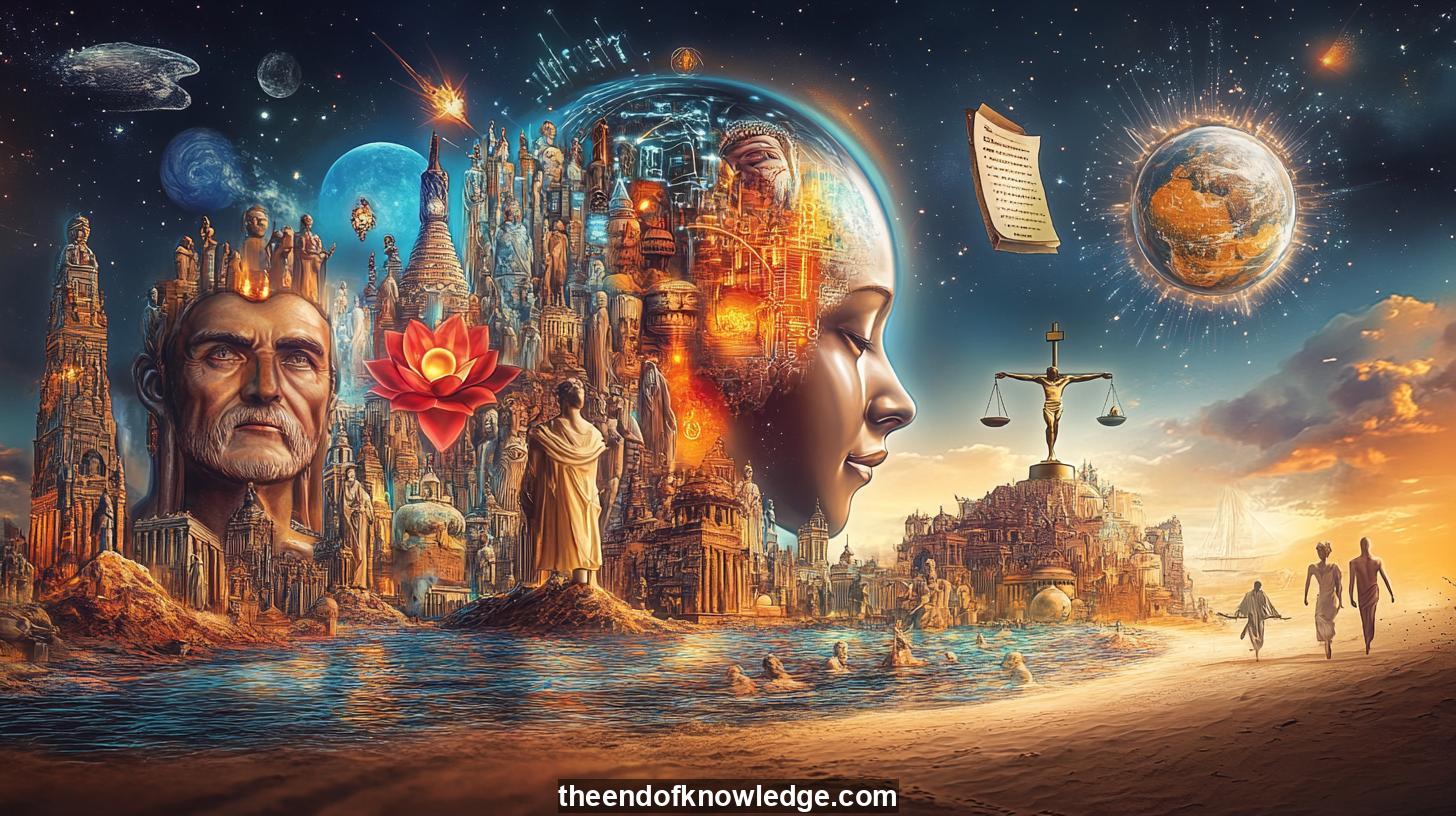Concept Graph, Resume & KeyIdeas using DeepSeek R1 :
graph LR
classDef humanEgo fill:#f9d4d4, font-weight:bold, font-size:14px;
classDef aiDev fill:#d4f9d4, font-weight:bold, font-size:14px;
classDef emotion fill:#d4d4f9, font-weight:bold, font-size:14px;
classDef philosophy fill:#f9f9d4, font-weight:bold, font-size:14px;
classDef brain fill:#f9d4f9, font-weight:bold, font-size:14px;
classDef society fill:#d4f9f9, font-weight:bold, font-size:14px;
A[Vault7-47] --> B[Human ego reshaped
by historical figures.2,15]
A --> C[AI reflects human
ingenuity, debated superiority.3,13]
A --> D[Emotional intelligence: human
uniqueness vs AI.4,12]
A --> E[Philosophies emphasize love,
transcendence.8,18,19]
A --> F[Brain processes emotion
and reason.5,14]
A --> G[AI's societal risks
and ethics.6,7,10,16,20,22,24,27,28,29,30]
B --> H[Copernicus/Freud challenged
human centrality.2]
B --> I[Freud shaped psychological
understanding.15]
B --> J[AI challenges human
decision-making.17]
C --> K[AI potential enhances
or threatens.9]
C --> L[Ethical AI requires
global cooperation.10,29]
C --> M[Balancing human and
AI futures.25]
D --> N[Empathy, social skills
define EI.12]
D --> O[EI vital for
AI collaboration.21,26]
D --> P[EI may be
AI-replicated.4]
E --> Q[Buddhism: non-attachment,
interconnectedness.18]
E --> R[Christianity's moral
framework for AI.19]
F --> S[Emotion-reason interplay
in brain.5]
F --> T[Brain evolution underpins
processing.14]
G --> U[Job displacement requires
adaptation.6,20]
G --> V[AI ethics demand
human well-being.7,22,27]
G --> W[AI challenges human
uniqueness.28,30]
G --> X[Historical context informs
AI role.24]
class A humanEgo;
class B,C,D,E,F,G humanEgo;
class H,I,J humanEgo;
class K,L,M aiDev;
class N,O,P emotion;
class Q,R philosophy;
class S,T brain;
class U,V,W,X society;
Resume:
The discussion delves into the intersection of artificial intelligence (AI) and human ego, exploring how AI challenges traditional views of human centrality. Historically, humanity's ego has been shaped by figures like Copernicus and Freud, who highlighted our non-central position in the universe and the influence of the unconscious mind. AI represents a new challenge, questioning human uniqueness and prompting a reevaluation of our role in the world.
The concept of ego is central to this exploration, with AI's development reflecting human ingenuity while also potentially surpassing human capabilities. Emotional intelligence is discussed as a uniquely human trait, but AI's ability to simulate emotions raises questions about its potential to replicate or even exceed human emotional complexity. The brain's role in processing emotions and rationality is examined, emphasizing the interconnectedness of these functions.
The societal implications of AI are profound, with discussions on job displacement, ethical regulation, and the need for empathy in AI development. The conversation touches on the importance of aligning AI with human values to foster a harmonious coexistence. Philosophical perspectives, including Buddhism and Christianity, are considered, highlighting the need for love and transcendence in guiding AI's role.
The transcript also addresses the future of AI, contemplating whether it will serve humanity or become a force beyond our control. The potential for AI to either augment human life or lead to dystopian scenarios is debated, underscoring the importance of responsible development and regulation. The discussion concludes with reflections on the ethical and existential questions AI poses, urging a balanced approach that respects both human and artificial intelligence.
Overall, the conversation navigates the complexities of AI's impact on human identity, emphasizing the need for empathy, ethical considerations, and a redefined sense of purpose in a world where human and artificial intelligence coexist.
30 Key Ideas:
1.- AI challenges traditional views of human centrality in the universe.
2.- Copernicus and Freud influenced human ego through their discoveries.
3.- AI's development reflects human ingenuity and potential superiority.
4.- Emotional intelligence is uniquely human but may be replicated by AI.
5.- The brain processes emotions and rationality interdependently.
6.- AI's societal impact includes job displacement and ethical concerns.
7.- Aligning AI with human values is crucial for harmonious coexistence.
8.- Buddhist and Christian philosophies emphasize love and transcendence.
9.- AI's future role could either enhance or threaten human life.
10.- Responsible AI development requires ethical regulation.
11.- AI raises existential questions about human purpose and identity.
12.- Emotional intelligence involves empathy and social skills.
13.- AI's potential to surpass human capabilities is debated.
14.- The brain's evolution underpins human emotional and rational processing.
15.- Historical figures like Freud shaped understanding of human psychology.
16.- AI's integration into society necessitates empathy and ethics.
17.- Human ego is challenged by AI's capacity for rational decision-making.
18.- Buddhism offers insights into non-attachment and interconnectedness.
19.- Christianity's message of love provides a moral framework for AI.
20.- AI's impact on employment requires adaptive strategies.
21.- Emotional intelligence is vital for navigating AI's influence.
22.- AI's ethical development must consider human well-being.
23.- The interplay between emotion and reason in AI is complex.
24.- Historical perspectives inform understanding of AI's societal role.
25.- AI's future depends on balancing human and artificial intelligence.
26.- Emotional intelligence enhances human-AI collaboration.
27.- Ethical AI ensures technology serves humanity's best interests.
28.- AI challenges traditional notions of human uniqueness.
29.- Responsible AI development requires global cooperation.
30.- AI's integration into society demands a redefined human purpose.
Interviews by Plácido Doménech Espí & Guests - Knowledge Vault built byDavid Vivancos 2025
 >
>